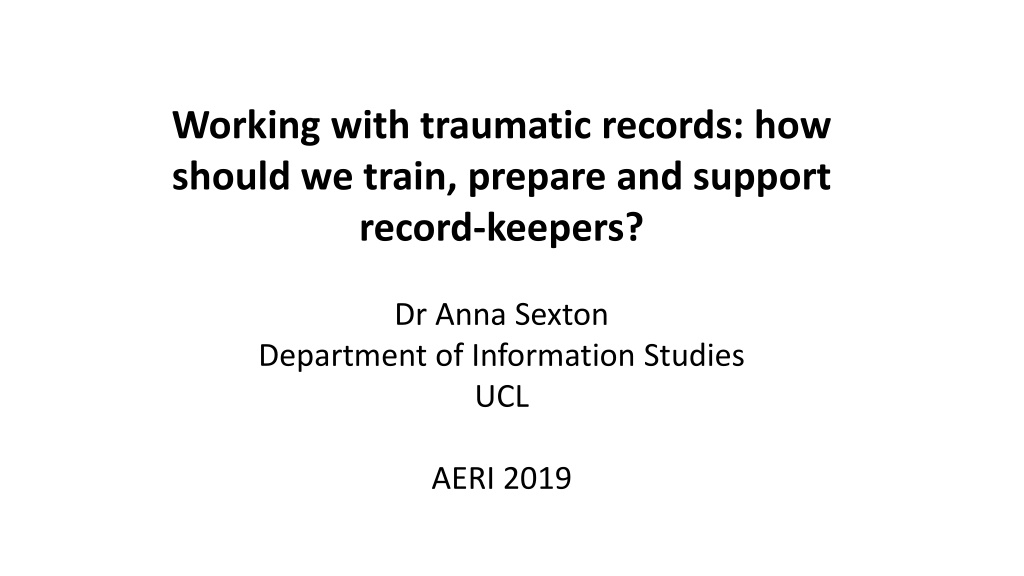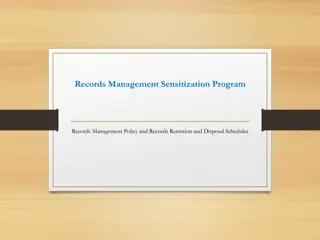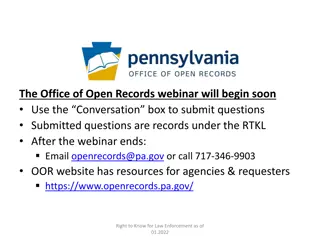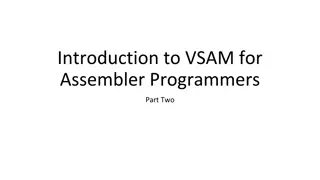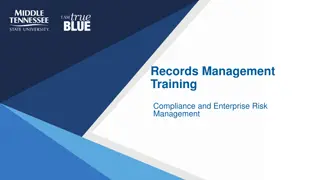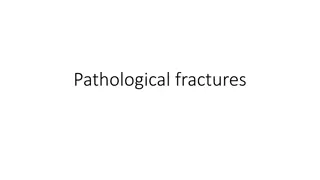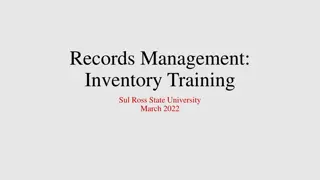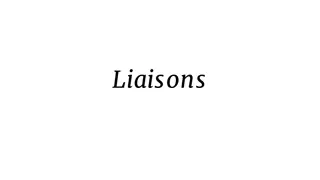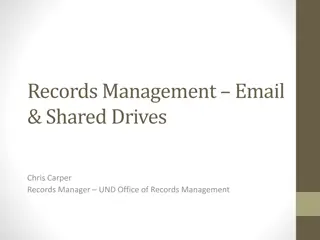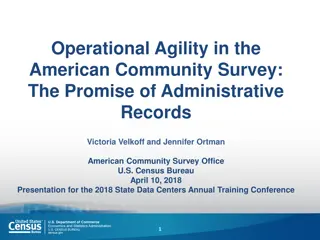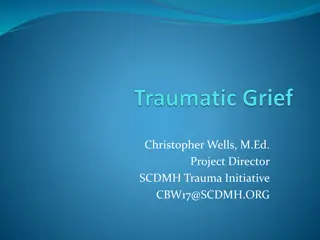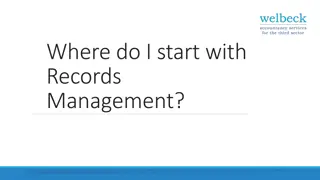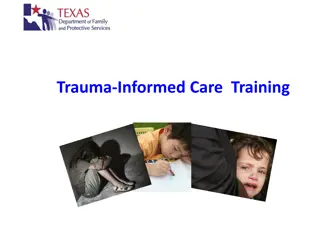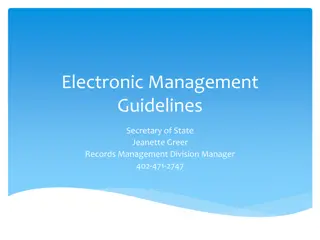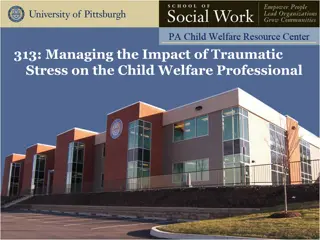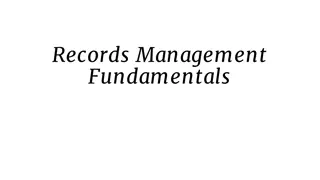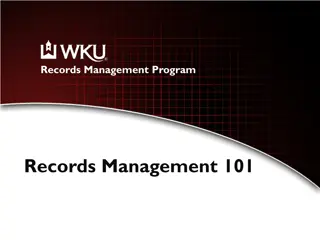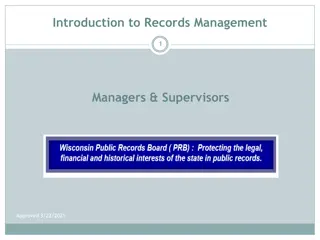Supporting Record-Keepers Dealing with Traumatic Records
Understanding the impact of traumatic experiences on record-keepers is crucial in training, preparing, and supporting them. Trauma, whether singular, ongoing, or complex, can be represented in records stored in archives. The potentiality of records to carry traumatic experiences requires a thoughtful and sensitive approach in managing and accessing such information. Recognizing trauma as an external event that pervades one's life, healing and recovery are possible through trauma-informed approaches. Layers of traumatic potentiality in record-keeping systems and processes add complexity to managing traumatic records effectively.
Download Presentation

Please find below an Image/Link to download the presentation.
The content on the website is provided AS IS for your information and personal use only. It may not be sold, licensed, or shared on other websites without obtaining consent from the author. Download presentation by click this link. If you encounter any issues during the download, it is possible that the publisher has removed the file from their server.
E N D
Presentation Transcript
Working with traumatic records: how should we train, prepare and support record-keepers? Dr Anna Sexton Department of Information Studies UCL AERI 2019
Starting points: Trauma is the result of a deeply disturbing or distressing experience Trauma can be: Singular a traumatic event Ongoing related to repeated and prolonged traumatic experience Complex related to exposure to varied and multiple traumatic events, often of an invasive, interpersonal nature There are instances of records that act as representations of disturbing or distressing experience
Starting points: Documents and other artifacts stored in archives are often considered as potential evidence (or potential sources of evidence) of events that occurred in the past. Such artifacts are known as records in virtue of this potentiality Furner, J (2004) Conceptual Analysis: A Method for Understanding Information as Evidence, and Evidence as Information, Archival Science, 4 (3-4), pp.233-265. In a similar vein to Furner s concept of potentiality we might say that records carry traumatic potentiality
What is trauma? Psychological trauma is the unique individual experience of an event or of enduring conditions in which the individual s ability to integrate their emotional experience is overwhelmed (Pearlman & Saakvitne, 1995, p. 60)
Trauma is: An external event. No one traumatises themselves. It is subjective. Only the person can say what haunts her. It is pervasive, inhabiting every corner of one s life. Healing happens. The haunting can end. Filson, B (2016) The haunting can end: trauma-informed approaches in healing from abuse and adversity in Russo, J and Sweeney, A Searching for a Rose Garden: Challenging psychiatry, fostering mad studies, London: PCCS Books
Layers of traumatic potentiality Trauma through recordkeeping sytem/processes e.g. description, access etc Trauma through representation of experience in the record Traumatic Experience/Traumatic Memory
Threads in Craigs reflection Flexibility in relation to access arrangements, individualised approach Sensitively negotiating a power dynamic between archivist and requester and the broader context of institutional power Clearly communicating from initial contact onwards Listening, acknowledging, being present to the extent that is desired, needed, welcomed Judging when to withdraw Carefully considering boundaries and the limits of expertise and offer we are archivists, not therapists or counsellors
Questions: How best to theoretically and conceptually ground the teaching to enable students to develop an appropriate mindset? What practical skillset do record-keepers need to develop in order to become adept practitioners around records with traumatising content, including the effective management of their personal wellbeing? What teaching methods should be employed to support student development of an appropriate skillset? Who should be involved in equipping and teaching our students, and to what extent it is possible to involve survivors of trauma who may be subjects in the records we care for, in recordkeeping education around traumatic records? What responsibilities do we have as a field to develop broader training and peer networks to ensure that record-keepers working in this area remain equipped, supported and sustained in the long term?
Helpful starting points from inside our field: Radical empathy and an ethics of care: Archivists are seen as caregivers, bound to records creators, subjects, users, and communities through a web of mutual affective responsibility Caswell & Cifor (2016) From Human Rights to Feminist Ethics: Radical Empathy in the Archives, Archivaria, vol. 81, 2016, pp. 23-43.
Helpful starting points from outside our field: Discourses around Trauma Informed Care (emerging from both survivor and therapeutic perspectives) Five principles: Safety .. Transparency and Trustworthiness. ... Choice. ... Collaboration and Mutuality. ... Empowerment
Emerging map for a trauma-informed approach to record-keeping teaching: Issues -Trauma or healing? -Reinforced oppression or reparation/liberation? Skills Theories/concepts/models/frameworks Teaching methods Individual/ Community Experience of the record -Valuing experiential knowledge -Including experts by experience in delivery Required interpersonal skills: -listening -communicating -acknowledging -balancing -perceiving -empathising -cultural competence -prioritising work- life balance -ability to understand/ set boundaries around self and other Within our field: -Critical Archival Studies -Social Justice -Radical Empathy -Affect of Records -Ethics of Care -Liberatory/Carceral Archives -Vicarious trauma -Emotional labour -Meaningful practice -STEEPLE conditions around the record -Recordkeeping structures and processes that hinder/enable -Role-play Record- keeper -Case study approach real world examples Beyond our field: -Survivor generated knowledge -Trauma studies -Trauma-informed approaches -Well-being frameworks -Reflective Practitioner Frameworks The Record
Dr Anna Sexton Department of Information Studies Gower Street London WC1E 6BT a.sexton.11@ucl.ac.uk @annasexton100
